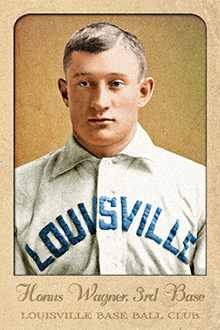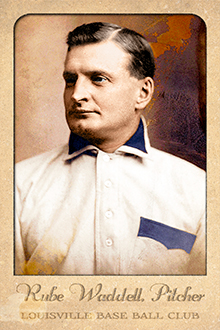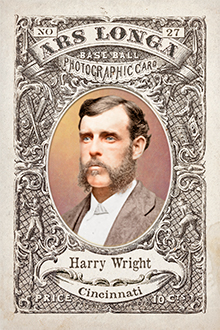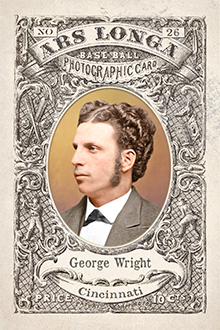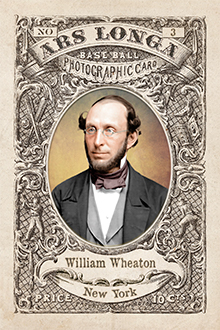- Series: Pioneer Portraits II: 1875-1899
- City: Louisville
- Team: Colonels
- League: National League
- Hall: National Baseball Hall of Fame
Johannes Peter Wagner (1874-1955) was, simply, the greatest shortstop who ever played the game. The Pittsburgh icon was among the first five selections to Cooperstown in 1936 in recognition of overall prowess afield, at bat and on base unparalleled in baseball. Even his closest rival for “All-Time Best” honors, Ty Cobb, said Honus was “maybe the greatest star ever to take the diamond.” Badgered mercilessly by ‘Nuf Ced’ McGreevy’s Royal Rooters in the ’07 Series with Boston, Wagner was deeply wounded by his mediocre performance. He achieved some vindication 2 years later, leading the Pirates over Cobb’s Tigers.
- Space doesn’t allow a fair summary of Wagner’s hitting records. A marvel at the plate.
- Was a Pirates’ coach for 39 years, mentoring several future Hall of Famers
- Elected to Hall of Fame: 1936
- Series: Pioneer Portraits II: 1875-1899
- City: Louisville
- Team: Colonels
- League: National League
- Hall: National Baseball Hall of Fame
George E. Waddell (1876-1914) was one of the premier pitchers in MLB history and also a man-child who’d leave the dugout and chase a fire truck. His titanic struggles with Cy Young made for the greatest pitching duels of all time. Connie Mack described his curve as the “fastest and deepest I’ve ever seen.”
- Waddell’s perplexing personal and social problems led to a shortened career and life
- Driven to distraction, Mack sold Rube to the Browns for the ’08 season, his last hurrah
- Elected to Hall of Fame: 1946
- Series: Pioneer Portraits I: 1850-1874
- City: Cincinnati
- Team: Red Stockings (NABBP)
- League: National Association (NABBP)
- Hall: National Baseball Hall of Fame
William Henry Wright (1835-1895) established professional baseball on the American landscape with his 1869 Cincinnati Red Stockings, a team with which he show-cased the game that was to become the true national pastime. His influence on the sport is incalculable. For 25 years Wright led as player, manager, executive, and chief of umpires. Perhaps his greatest contribution was inspiring true team-spirit. He invented such staples as signals, platooning, hit-and-run, communication among players and a nascent farm system.
- Managed his teams to over 1200 wins, a .581%, winning six championships
- Elected to Hall of Fame: 1953
- Series: Pioneer Portraits I: 1850-1874
- City: Cincinnati
- Team: Red Stockings (NABBP)
- League: National Association (NABBP)
- Hall: National Baseball Hall of Fame
George Wright (1847-1937) was considered baseball’s best player while starring for the Cincinnati Red Stockings, the game’s first professional team. He continued to excel at shortstop and at bat for the team his brother Harry moved to Boston in 1871. He co-founded Wright & Ditson Sporting Goods, contributing to tennis, hockey and golf, and built America’s first public golf course. He also fathered two US tennis champions.
- Wright was a seven-time league champion with Cincinnati, Boston and Providence
- Was a consultant on the foundation of the National Baseball Hall of Fame
- Elected to Hall of Fame: 1937
- Series: Pioneer Portraits I: 1850-1874
- City: New York
- Team: Knickerbockers
William Wheaton (1814-1888) was an early pioneer of the new game of “base ball.” He was an officer in the Knickerbocker Club and served on its rules committee. According to his own account he may have been the first to codify rules of the game, for the Gotham Base Ball Club in 1837.
- Took time from his law practice to play the new game with business associates
- Received a federal appointment from President Grant, 1876-86
- In ‘87 bemoaned the fast pace of life compared to the days he could while away on the diamond
- John Thorn, official historian of MLB, champions Wheaton as the true “father of baseball”
